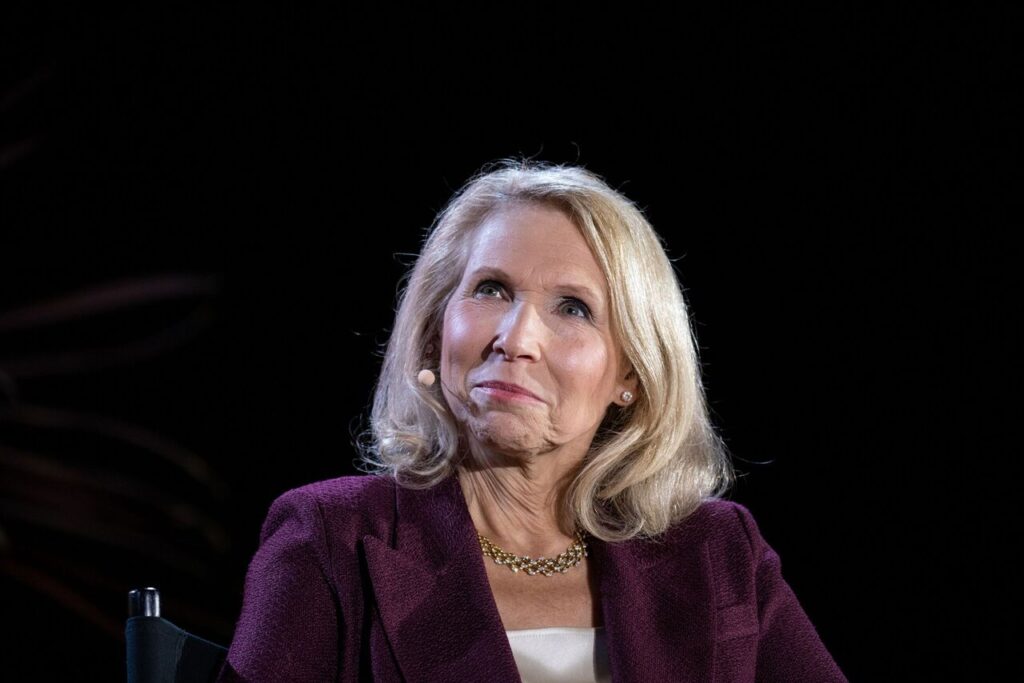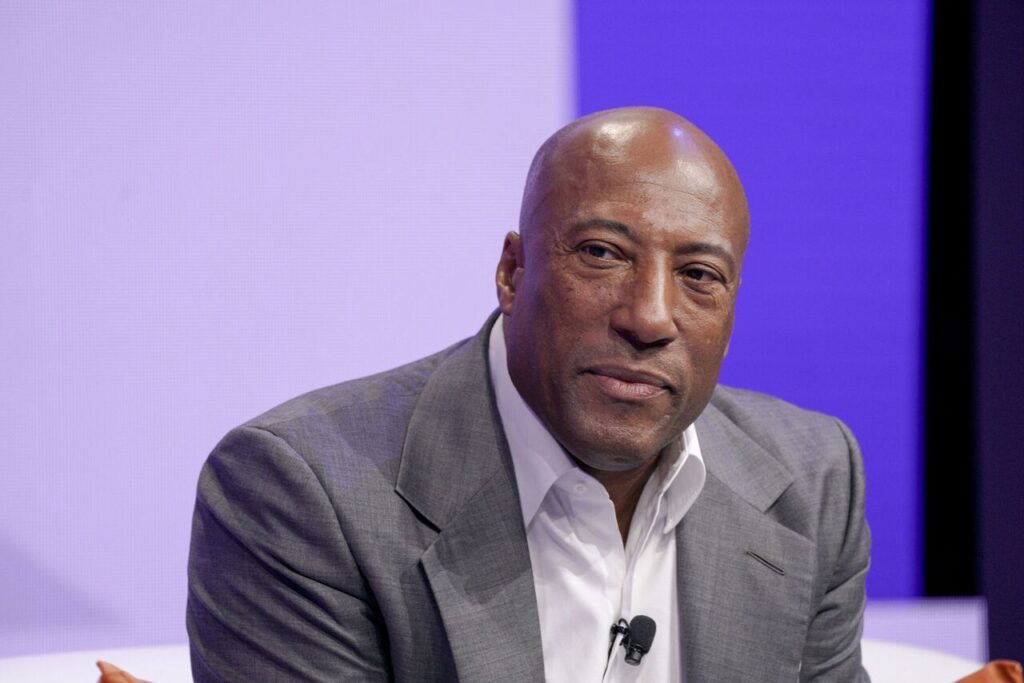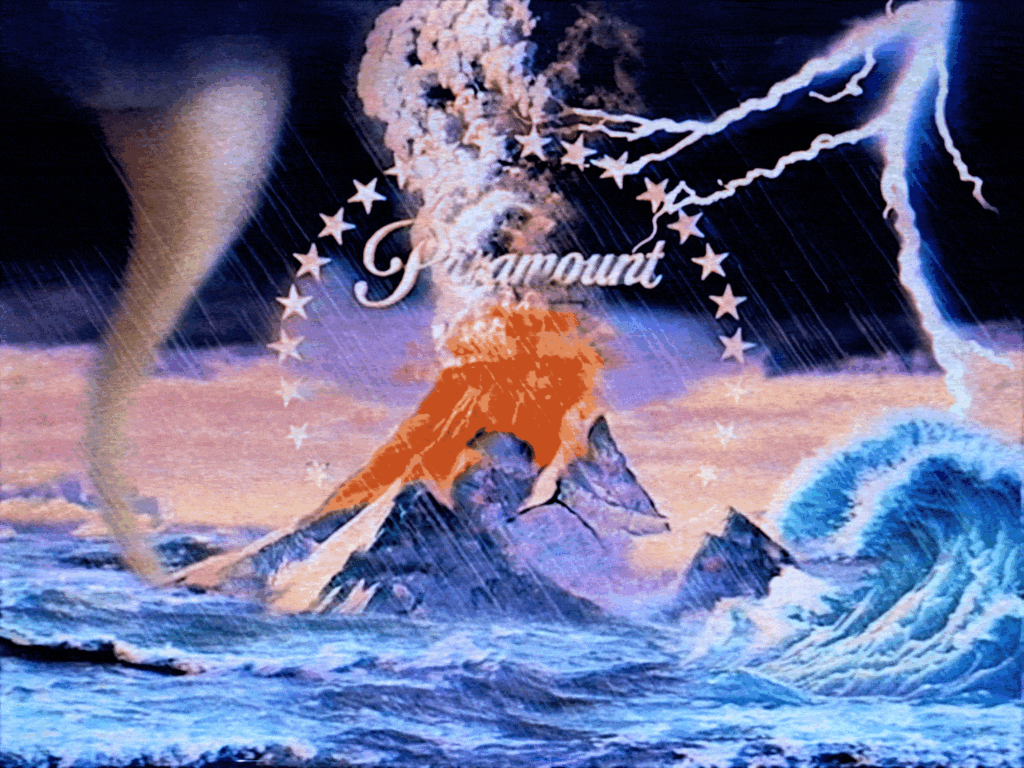February 16, 2024 at 11:00 AM GMT
Sumner Redstone was an avid acquirer, not a seller. Beginning in the mid-1980s, he transformed his family’s movie theater chain into one of the world’s most valuable media conglomerates, Viacom, through a series of high-profile acquisitions. He skillfully outmaneuvered competitors to procure a legendary broadcast network (CBS), an iconic studio (Paramount Pictures), and popular cable channels (Nickelodeon and MTV).
Redstone reveled in the glamorous Hollywood lifestyle. He frequented premieres, indulged in romantic relationships with younger partners, and entertained celebrities at his lavish Los Angeles estate. He staunchly refused to part with any aspect of his company. In 2016, when then-Chief Executive Officer Philippe Dauman attempted to sell a minority stake in Paramount studio to raise funds amidst the company’s struggles, the 93-year-old Redstone promptly ousted Dauman, his long-standing lawyer and protege, from the company. In his memoir, “A Passion to Win,” Redstone, a lawyer himself, declared, “Viacom is at the center of my life. It is my world.”

Sumner RedstonePhotographer: Michael Tran/Getty Images
In 2020, Redstone passed away, leaving his heirs to contend with the crumbling foundation of his media empire, centered around movies and cable TV. The landscape has dramatically shifted since Redstone’s heyday, with the number of live-TV subscribers dropping by approximately 30 million from its peak of over 100 million since 2010. Moreover, domestic movie theater attendance has dwindled to historic lows.
Redstone’s TV networks have borne the brunt of these changes, particularly among their core audience of viewers under 34, who have increasingly turned to platforms like Netflix, TikTok, and YouTube. Despite efforts by Paramount Global, as the company is now known, to mitigate losses through cost-cutting measures, the decline in viewership and advertising revenue has only intensified. Paramount’s TV ad sales are estimated to have declined by $1 billion in the past year alone.
Upon assuming the role of chairman after her father’s passing, Sumner’s daughter, Shari, believed that streaming could revitalize the company. Paramount Global invested billions in original series for its flagship streaming service, Paramount+, including spinoffs of popular shows like Yellowstone and expansions of the Star Trek franchise. However, despite substantial investment, Paramount+ has struggled to attract a sizable audience, accounting for less than 1% of TV viewing in November. Lagging behind competitors like Netflix, Hulu, Peacock, Roku Channel, and Tubi, Paramount’s streaming division is projected to have incurred losses of approximately $1.5 billion in 2023, adversely impacting the company’s overall earnings. (Paramount has indicated that its losses likely peaked the previous year.)

Shari RedstonePhotographer: Martina Albertazzi/Bloomberg
landscape. The collapse of cable TV and the ascendance of streaming have disrupted the entertainment industry, leading to widespread job losses, two labor strikes, and a wave of consolidation. “The entire industry is grappling with missteps,” remarks Rich Greenfield, an analyst at LightShed Partners, specializing in tech, media, and telecommunications research. Even entertainment titan Walt Disney Co. hasn’t been immune, having to lay off thousands of employees and slash billions from its programming budget.
While Paramount isn’t solely accountable amid this tumultuous media climate, Greenfield suggests the company has less room for error compared to its counterparts. Unlike Disney, which boasts lucrative theme parks, and Warner Bros. Discovery Inc., owner of the largest TV studio, Paramount relied entirely on profits from traditional TV networks last year, as projected. Consequently, Wall Street’s confidence in the company has waned considerably. Paramount’s market capitalization has plummeted below $9 billion, less than a third of its value five years ago. Laden with over $16 billion in debt and minimal incoming cash flow, Paramount has been compelled to reduce the dividend paid to National Amusements Inc., the Redstones’ holding company. Shari Redstone, faced with Paramount’s decline, has contemplated a move her father would never consider: selling the family business.
Over recent months, Redstone has informally explored options, as reported by over a dozen interviews with insiders, including current and former employees, financial advisors, and potential buyers. Discussions have centered on selling control of Paramount to interested parties like emerging media tycoon David Ellison, private equity firm Apollo Global Management Inc., and Warner Bros. Discovery, home to HBO and CNN. Byron Allen, a former stand-up comedian, has submitted two separate bids for Paramount, the first of which was rebuffed. Yet, the prospects of a deal remain uncertain, hindered by high interest rates, a cautious federal government regarding mergers, and Paramount’s declining stock value.

David EllisonPhotographer: Angela Weiss/Getty Imag
If Redstone fails to find a solution, Paramount risks becoming an emblem of an industry titan’s decline, exposing broader sectoral deterioration. Paramount’s decline imperils its storied studio, an institution with an almost 112-year history, responsible for classics like The Godfather, Grease, and Titanic. It also threatens CBS News, home to iconic journalists like Edward R. Murrow, Walter Cronkite, and 60 Minutes. MTV, Nickelodeon, and Comedy Central, once cultural cornerstones for generations, now fade from relevance in the eyes of those born in the current century.
The company’s challenges serve as a cautionary tale for Hollywood, which sought to evade the fate of industries like newspapers, magazines, and music, all ravaged by the internet. Yet, as media firms struggle with the transition from cable to streaming, they cede the next generation of viewers to short-form video apps and services owned by tech giants in Silicon Valley and China. Despite restructuring and layoffs, Hollywood’s reliance on innovation and growth remains uncertain, prompting queries about the industry’s trajectory.
Sumner Redstone’s decision to split CBS from Viacom in 2006 reflected his belief in the latter’s potential amid a burgeoning cable landscape. However, Shari opposed the move, leading to multiple disagreements and her eventual divergence from the family business. After contentious battles for control against figures like Philippe Dauman and Leslie Moonves, Shari reunited CBS and Viacom in 2019, aiming to bolster their competitive stance against streaming behemoths like Netflix and Amazon.
Betting heavily on streaming, Redstone and CEO Bob Bakish positioned Paramount+ as a rival to Netflix, touting original content and banking on existing franchises like Yellowstone and Star Trek. Despite initial successes, including rapid customer acquisition and Pluto TV’s explosive growth, Paramount+ faced headwinds as investor sentiment shifted toward profitability amidst rising inflation and geopolitical tensions. Bakish’s reluctance to entertain offers for Showtime and the failed attempt to sell BET raised concerns about Paramount’s strategic direction and financial management.
As Paramount navigates these challenges, the company’s future remains uncertain, with ongoing discussions surrounding potential divestments and strategic partnerships. The outcome will determine not only Paramount’s fate but also its significance in an ever-evolving media landscape.

Byron AllenPhotographer: Kyle Grillot/Bloomberg
Redstone faced deeper concerns as Paramount’s struggles led to a reduction in shareholder dividends, exacerbating financial troubles for her family. National Amusements heavily relied on Paramount’s financial support to sustain its struggling movie theater chain and address its debts. In May, National Amusements raised $125 million by selling a stake to an investment firm led by Michael Dell and Byron Trott. The competition with Netflix significantly impacted the balance sheet, causing substantial financial challenges, as noted by LightShed’s Greenfield. The Redstone family’s stake in its media holdings has plummeted from over $5 billion in 2015 to around $1 billion presently. Trott is now counseling Redstone on the potential sale of National Amusements.
After the events of October 7, when Hamas massacred around 1,200 Israelis and foreigners and abducted hundreds more, which culminated to an Israeli invasion of Gaza, Redstone became even more determined to break free from her dwindling media empire. “My life has been upside down ever since October 7th,” she declared in December at a gathering organized by the entertainment trade publication TheWrap. She said that she is utilizing her platform to raise awareness of these concerns and voiced fear for her safety as well as the survival of Israel and the Jewish people. “At this point, it consumes all of my thoughts and drives me from the moment I wake up until the moment I go to bed.”
Redstone has been reluctant to discuss acquisition offers for the company for years, but he is now open to hearing them. Ever since arriving in Hollywood as a twentysomething with aspirations of becoming a movie director, Skydance Media CEO David Ellison has found himself pulled to Paramount Pictures. Few movies had the same impact on him as Top Gun from Paramount. His passion of aviation inspired the name of his company, and he was encouraged to become a pilot after seeing the movie on VHS tapes, laser discs, and DVDs. For fifteen years, Skydance and Paramount have collaborated on and co-financed several of the studio’s biggest films. Ellison collaborated with Paramount on Brad Pitt’s World War Z and the Oscar-nominated True Grit. His company currently owns a significant portion of many of Paramount’s most lucrative properties, such as Star Trek and Mission: Impossible. In addition, he produced Maverick from Top Gun.
Ellison has diversified his business interests by venturing into animation alongside former Pixar Animation Studios head John Lasseter and sports, securing docuseries deals with the NFL. In 2022, Skydance successfully secured $400 million in funding from investors, among them private equity firms RedBird Capital Partners and KKR. More recently, the 41-year-old entrepreneur enlisted the support of his father, tech magnate Larry Ellison, along with these investors, to submit a preliminary bid for National Amusements. If successful, this move would grant him control of Paramount, enabling its integration with Skydance and propelling him into the upper ranks of media moguls.
While Redstone has engaged with Ellison and his father on various occasions, she has shown less receptiveness towards Byron Allen, who has orchestrated an unconventional media venture by amalgamating the Weather Channel with local TV stations. Allen has made unsuccessful attempts to acquire several high-profile entities in recent years, such as the Denver Broncos, the ABC broadcast network, and BET. Investors have frequently raised doubts about Allen’s ability to secure financing for these ventures. Paramount reportedly rejected Allen’s proposals, believing they could fetch higher bids. Paramount has opted not to provide commentary on Allen’s bids, or those from any other parties.
Sources close to Redstone revealed to Businessweek that there are additional potential buyers in the negotiation mix, though they opted not to disclose their identities. While private equity firms have shown interest in Paramount, they have refrained from submitting independent bids. The prevailing high interest rates have made financing the acquisition of a multibillion-dollar media enterprise prohibitively expensive.
Furthermore, other media conglomerates like Warner Bros. Discovery and Comcast have also expressed interest in Paramount. CEO David Zaslav of Warner Bros. Discovery has engaged in discussions with Redstone and Bakish and has enlisted financial advisors to explore the feasibility of making a bid. However, the current regulatory environment suggests that any acquisition could lead to prolonged litigation and complications for Zaslav. Consequently, he must exercise caution and ensure that any deal aligns with his company’s long-term strategic objectives.

David ZaslavPhotographer: Kevin Dietsch/Getty Images
Insiders familiar with the negotiations suggest that there is approximately a 50% likelihood of a deal materializing. The complexity of the situation arises from Redstone’s endeavor to sell controlling interest in Paramount via her family’s holding firm, which adds layers of intricacy to any potential agreement. Notably, Redstone anticipates that her controlling shares will command a higher valuation compared to those held by common shareholders. Notably, Warren Buffett, Paramount’s largest shareholder, has remained silent on the matter, while investor Mario Gabelli, another significant stakeholder, has voiced reservations about the potential deal.
Several potential buyers indicate their willingness to wait for a year or two for the company’s value to depreciate further. Forecasts suggest that Redstone’s cable networks are poised for further decline, facing financial strain from pay-TV providers like Charter Communications Inc. These operators have compelled other media entities to remove underperforming channels from their cable packages. Additionally, Paramount’s streaming service is still far from generating substantial profits and has limited international reach, despite the aggressive promotion it received during the Super Bowl. Analysts, including Greenfield, have advocated for Paramount to close its streaming service and pivot to a pure studio model, selling its flagship shows to other streaming platforms. However, such a shift would entail significant layoffs, a prospect Redstone is reluctant to entertain. Instead, she seeks a new owner who will uphold her father’s legacy by investing in the company rather than dismantling it.
Sumner Redstone initiated acquisitions at the outset of the cable era, whereas his daughter finds herself in the role of a seller as the industry approaches a transformational phase. Should she fail to secure a deal, the outlook appears grim. Paramount recently announced plans to reduce its workforce by approximately 800 positions, marking at least the fourth round of downsizing in the past 18 months.

